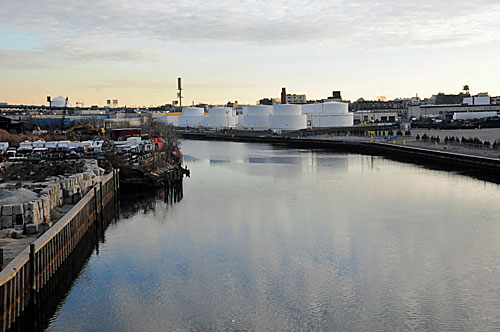Greenpoint’s oil polluters will be spending their summer vacation wading through Newtown Creek.
The city and five energy companies responsible for the largest oil spill in state history have agreed to study the extent of the contamination at the murky 3.8-mile waterway.
Newtown Creek’s polluters, which include Phelps Dodge Refining Corporation, Texaco, BP America, National Grid, ExxonMobil, and the city, pledged to conduct the new study with federal oversight — and pay the federal Environmental Protection Agency $750,000 for all the previous clean-up work done in Greenpoint, plus any additional oversight costs.
“The agreement ensures that the parties responsible for the pollution, not the taxpayer, will foot the bill,” said Environmental Protection Agency administrator Judith Enck.
The polluters’ agreement marks the latest significant cleanup development at Newtown Creek since the federal agency declared the waterway a Superfund site last September.
Two months later, state leaders reached a record $25-million settlement with ExxonMobil, which has agreed to clean up some of the more than 17-million gallons of oil that seeped under northern Greenpoint. ExxonMobil also agreed to kick in an additional $20 million to fund projects that improve the neighborhood’s environment.
The fetid waterway has accumulated pollution in its sediment and water since the 1850s, when it was one of the busiest hubs of industrial activity in the country.
More than 50 oil refineries, as well as metal factories, lumber yards, chemical plants, glue and fertilizer factories, set up shop on the banks of the waterway in the mid-19th century. All told, more than 100 years worth of toxic substances has seeped into Newtown Creek’s sediment — and ultimately into the water.
Many of those refineries closed in the late 20th century, but the energy companies that acquired their properties are still liable for any pollution that occurred at the site, according to federal law.
So far, the companies have been cooperating with federal officials — which some hope will speed up the remediation.
“This cleanup is moving at a very good pace,” said Environmental Protection Agency spokeswoman Mary Miers. “We really haven’t experienced any delays. Theoretically if they weren’t cooperative, that could impact the cleanup.”
Still, it will be some time before the Newton Creek is toxin-free. Federal officials estimate the remedial investigation could take several years. After that, the actual cleanup begins, which could take more than a decade to complete.























